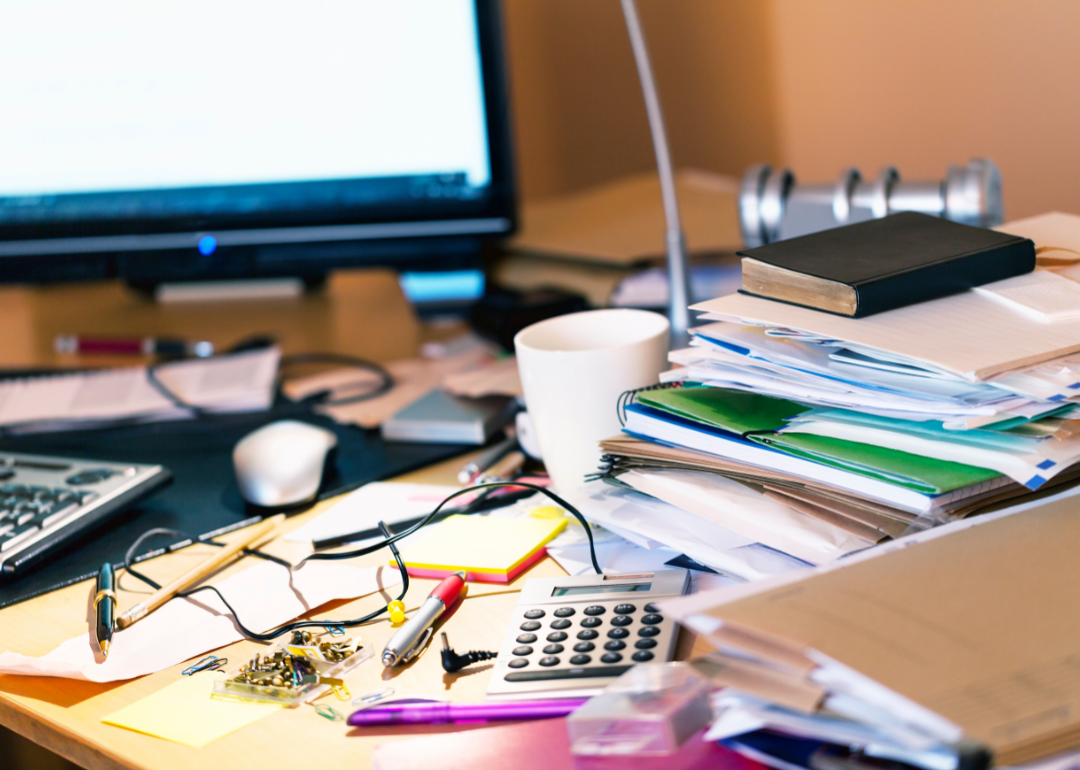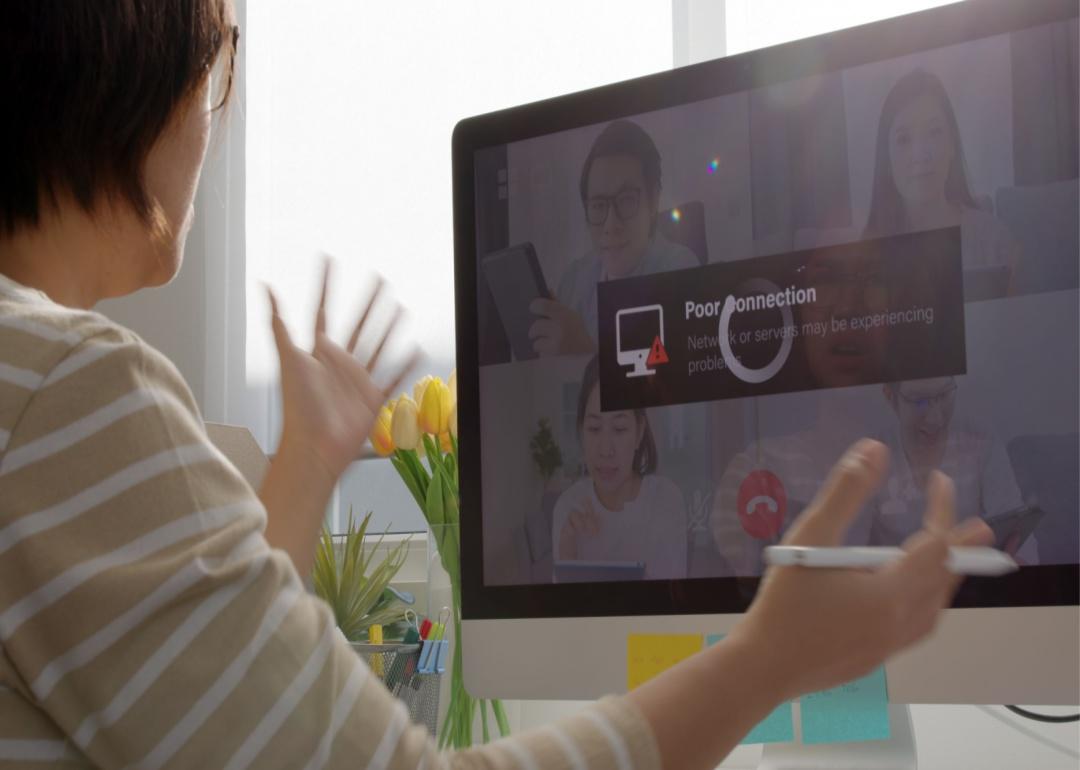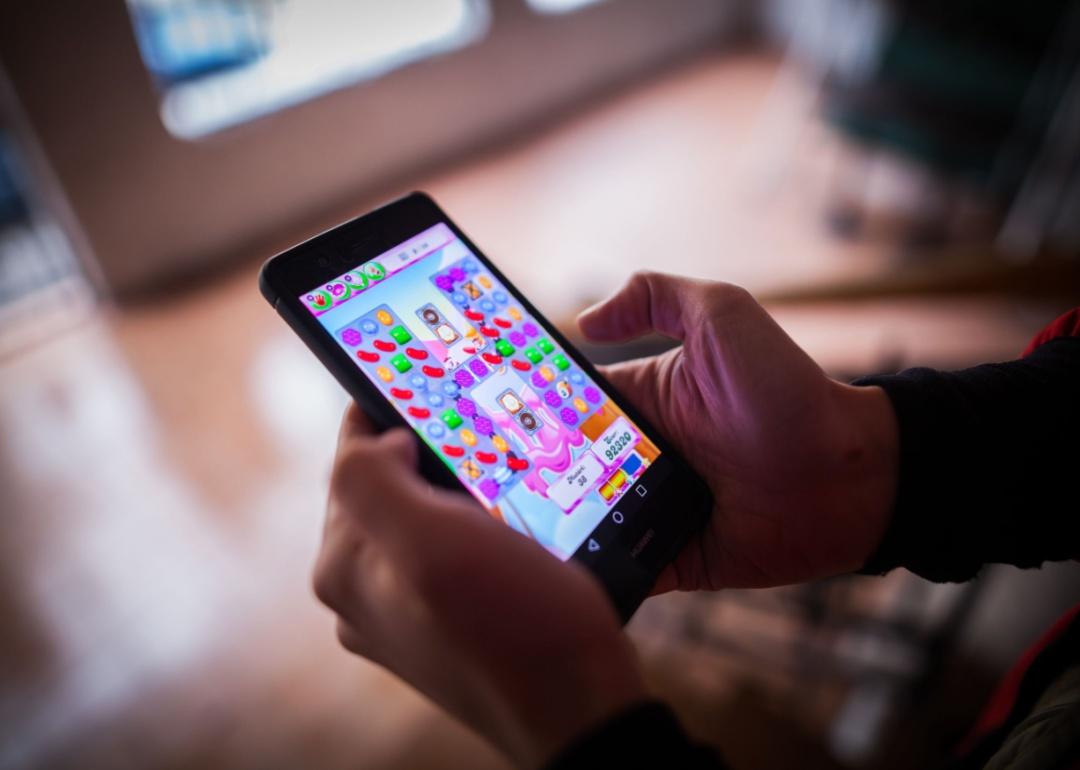10 office time-wasters and what to do about them
Canva
10 office time-wasters and what to do about them
A stressed woman at a desk with hands coming at her from all sides with phones and tasks.
Are you trying to work on your presentation between your daily Zoom calls?
Think you can take a client call while reviewing an overdue report?
Think again. Juggling multiple tasks may sound like a way to save time, but more than likely, you’ll end up exhausted, and your workflow—and work quality—will crash.
Research shows t multitasking can harm your mental health and productivity. One step to decrease your stress levels and boost productivity is to recognize that your time is valuable.
Make sure you’re using it wisely on the things that matter. Work alerts, notifications, emails, and meeting invites may seem neverending, so it’s valuable to know how technology could be consuming your day and how to manage it better.
ClickUp analyzed studies and resources from the National Institutes of Health, Harvard Business Review, and news reports to determine 10 of the most common office time-wasters and what to do about them.
![]()
wavebreakmedia // Shutterstock
TV and podcasts
A woman listening to headphones while working at her desk.
With access to streaming services with thousands of shows and millions of podcasts to choose from, there’s no question how media can easily consume our free time. You may notice your podcasts piling up and feel like you listen to them in the background as you’re finalizing a research report.
But can you genuinely dedicate your attention to both at the same time?
Many people believe they can switch between tasks without missing a beat. In reality, adults are becoming less efficient and overworking their brains for the sake of doing it all simultaneously. Single-tasking may save time and stress.
Girts Ragelis // Shutterstock
Meetings
A woman sitting at a desk on a group Zoom call.
Have you ever wanted to suggest to your colleague the meeting they held could have been an email? You’re not alone—many workers feel meetings can be a massive waste of time.
A 2019 study by consulting firm Korn Ferry found that 67% of workers believe too much time in meetings can prevent them from doing their job effectively.
To help convince your boss to reduce those weekly meetings, create a concise meeting agenda, keep a close eye on the time, and make sure there is a purpose and takeaway for every meeting to help reduce multiple check-ins and keep team members on task.
Offering to conduct a meeting audit for your boss could help reduce wasted time and could even save the company some money.
KeyStock // Shutterstock
Helicopter bosses
A group of people sitting around a table working.
Having a micromanager for a boss can be a miserable experience and can be considered a form of bullying. Constantly being monitored or questioned makes employees feel disempowered.
Helicopter bosses decrease morale, which can lead to inadequate performance and wasted time. Setting up a project management process that outlines the same expectations for the whole team can keep everyone on track and informed.
Micromanagers don’t always have bad intentions; consider partnering with them on a project to help build trust.
Canva
Social media
Two women at a laptop looking at a phone and smiling.
Check your social media screen time on your phone—you may be surprised to know just how much time you’re wasting scrolling through your feeds. Everyone loves a new trending dance challenge, but overconsumption can significantly hinder productivity at work.
A 2020 study found that social media usage may also lead to depression and anxiety. Consider turning off your social media notifications or taking a break by deleting some apps off your phone.
Chaay_Tee // Shutterstock
IT problems
A woman having technical issues while on a meeting on her computer.
Tech problems can cause a great deal of wasted time throughout the workday. Have you ever been in the middle of an important task when the Wi-Fi goes out? While the IT department works on it, you’re left twiddling your thumbs.
On average, workers lose almost two weeks a year troubleshooting tech issues, according to Robert Half Consulting. With the rise of remote work, these problems have increased, and people rely on their at-home technology without access to an IT consultant.
Updating your software and periodically rebooting your computer can work wonders for minor tech issues.
Canva
Decision overload
People sitting around a table at a work meeting.
Being in a position that requires you to make multiple decisions daily could lead to decision overload, which can cause a decrease in productivity and a corresponding increase in stress levels.
Analysis paralysis is a condition that delays the decision-making process and inhibits your ability to complete a task. One way to decrease the burden is to remove distractions, consult with colleagues if unsure about the best decision, or delegate the choice to another expert in your network.
Alexandru Nika // Shutterstock
Gaming
Playing candy crush game at a desk.
U.S. adults spend nearly an hour and a half each day playing mobile games, according to a February 2022 survey from Future Publishing. In May 2020, 80% of full-time workers admitted playing games at work, even during meetings.
Gaming at work can be a massive waste of time. As with social media, restrict your game time by temporarily removing gaming apps during work hours and setting a time limit on how much you can play in a given day.
Canva
Productivity theater
A woman using Slack.
How often have you had to prove to your boss that you’re being productive?
From updating your Slack status throughout the day to sending your boss useless messages to show you’re engaged, you may be performing productivity theater and wasting up to an hour daily putting on a show. Instead of sending endless clues to your boss that you’re working, consider a daily update on your progress via Slack before you clock out.
Canva
Overworking
A woman experiencing burnout at a computer.
Being creative is hard if you’re overworked and burned out. Many people worldwide are experiencing burnout, which can seriously affect our well-being.
Consider setting boundaries for yourself at work. If you work in an office, don’t make it a habit to take your work computer home and turn off Slack notifications after hours. Take a break when you are feeling stressed or nearing burnout.
Many companies are turning to wellness apps to help staff stave off burnout and decreased productivity.

Canva
Disorganization
A cluttered desk with stacked documents and assorted junk.
Disorganization and productivity rarely go hand and hand. Keeping your workspace neat can boost productivity and decrease stress.
We spend a lot of time at our desks, so why not make it an enjoyable environment? Take time to reorganize by installing a few floating shelves above your desk to remove visual distractions.
Consider tossing unnecessary items that you’ve been keeping. Your newly cleaned workspace can give you a fresh start to your day.
This story originally appeared on ClickUp and was produced and
distributed in partnership with Stacker Studio.









